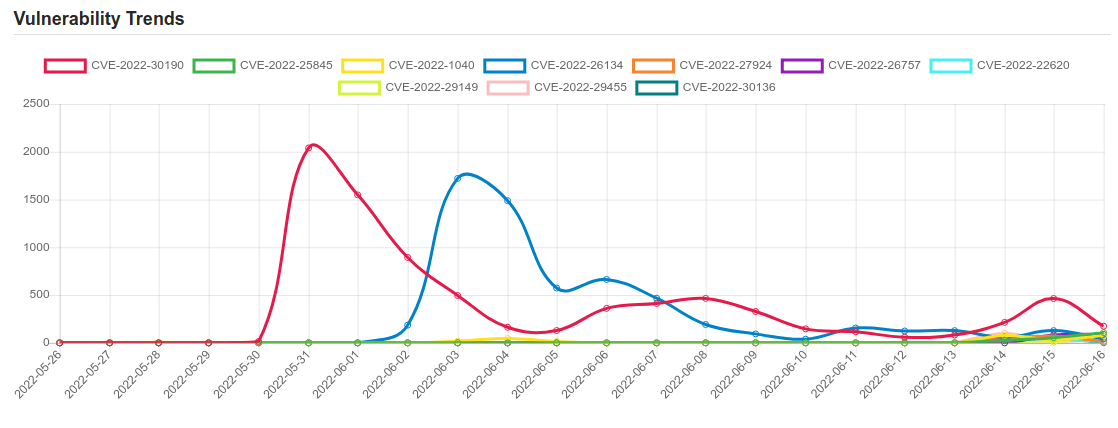Daily Vulnerability Trends: Fri Jun 17 2022

| CVE NAME | CVE Description |
| CVE-2022-24436 | Observable behavioral in power management throttling for some Intel(R) Processors may allow an authenticated user to potentially enable information disclosure via network access. |
| CVE-2022-23222 | kernel/bpf/verifier.c in the Linux kernel through 5.15.14 allows local users to gain privileges because of the availability of pointer arithmetic via certain *_OR_NULL pointer types. |
| CVE-2022-20798 | A vulnerability in the external authentication functionality of Cisco Secure Email and Web Manager, formerly known as Cisco Security Management Appliance (SMA), and Cisco Email Security Appliance (ESA) could allow an unauthenticated, remote attacker to bypass authentication and log in to the web management interface of an affected device. This vulnerability is due to improper authentication checks when an affected device uses Lightweight Directory Access Protocol (LDAP) for external authentication. An attacker could exploit this vulnerability by entering a specific input on the login page of the affected device. A successful exploit could allow the attacker to gain unauthorized access to the web-based management interface of the affected device. |
| CVE-2022-30139 | Windows Lightweight Directory Access Protocol (LDAP) Remote Code Execution Vulnerability. This CVE ID is unique from CVE-2022-30141, CVE-2022-30143, CVE-2022-30146, CVE-2022-30149, CVE-2022-30153, CVE-2022-30161. |
| CVE-2022-32158 | Splunk Enterprise deployment servers in versions before 9.0 let clients deploy forwarder bundles to other deployment clients through the deployment server. An attacker that compromised a Universal Forwarder endpoint could use the vulnerability to execute arbitrary code on all other Universal Forwarder endpoints subscribed to the deployment server. |
| CVE-2022-23088 | No description provided |
| CVE-2022-30163 | Windows Hyper-V Remote Code Execution Vulnerability. |
| CVE-2022-30190 | Microsoft Windows Support Diagnostic Tool (MSDT) Remote Code Execution Vulnerability. |
| CVE-2022-25845 | The package com.alibaba:fastjson before 1.2.83 are vulnerable to Deserialization of Untrusted Data by bypassing the default autoType shutdown restrictions, which is possible under certain conditions. Exploiting this vulnerability allows attacking remote servers. Workaround: If upgrading is not possible, you can enable [safeMode](https://github.com/alibaba/fastjson/wiki/fastjson_safemode). |
| CVE-2022-1040 | An authentication bypass vulnerability in the User Portal and Webadmin allows a remote attacker to execute code in Sophos Firewall version v18.5 MR3 and older. |
| CVE-2022-26134 | In affected versions of Confluence Server and Data Center, an OGNL injection vulnerability exists that would allow an unauthenticated attacker to execute arbitrary code on a Confluence Server or Data Center instance. The affected versions are from 1.3.0 before 7.4.17, from 7.13.0 before 7.13.7, from 7.14.0 before 7.14.3, from 7.15.0 before 7.15.2, from 7.16.0 before 7.16.4, from 7.17.0 before 7.17.4, and from 7.18.0 before 7.18.1. |
| CVE-2022-27924 | Zimbra Collaboration (aka ZCS) 8.8.15 and 9.0 allows an unauthenticated attacker to inject arbitrary memcache commands into a targeted instance. These memcache commands becomes unescaped, causing an overwrite of arbitrary cached entries. |
| CVE-2022-26757 | A use after free issue was addressed with improved memory management. This issue is fixed in tvOS 15.5, iOS 15.5 and iPadOS 15.5, Security Update 2022-004 Catalina, watchOS 8.6, macOS Big Sur 11.6.6, macOS Monterey 12.4. An application may be able to execute arbitrary code with kernel privileges. |
| CVE-2022-22620 | A use after free issue was addressed with improved memory management. This issue is fixed in macOS Monterey 12.2.1, iOS 15.3.1 and iPadOS 15.3.1, Safari 15.3 (v. 16612.4.9.1.8 and 15612.4.9.1.8). Processing maliciously crafted web content may lead to arbitrary code execution. Apple is aware of a report that this issue may have been actively exploited.. |
| CVE-2022-29149 | Azure Open Management Infrastructure (OMI) Elevation of Privilege Vulnerability. |
| CVE-2022-29455 | DOM-based Reflected Cross-Site Scripting (XSS) vulnerability in Elementor’s Elementor Website Builder plugin <= 3.5.5 versions. |
| CVE-2022-30136 | Windows Network File System Remote Code Execution Vulnerability. |
| CVE-2022-25636 | net/netfilter/nf_dup_netdev.c in the Linux kernel 5.4 through 5.6.10 allows local users to gain privileges because of a heap out-of-bounds write. This is related to nf_tables_offload. |
| CVE-2022-26937 | Windows Network File System Remote Code Execution Vulnerability. |
| CVE-2022-23823 | A potential vulnerability in some AMD processors using frequency scaling may allow an authenticated attacker to execute a timing attack to potentially enable information disclosure. |
If you like the site, please consider joining the telegram channel and supporting us on Patreon using the button below.


![[CACTUS] - Ransomware Victim: electrocraft[.]com 3 image](https://www.redpacketsecurity.com/wp-content/uploads/2024/09/image-300x300.png)